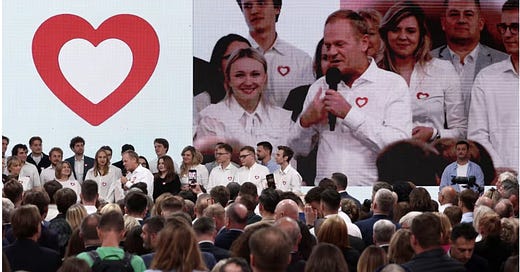Nationalists ousted in Poland: a game-changer for the EU
For a decade Law and Justice has joined with Viktor Orban in dismantling the rule of law, curtailing press freedom and blocking EU climate action. It looks like Polish voters have sent them packing.
At first glance, you might be wondering what all the fuss is about. After all, according to exit polls the far-right Law and Justice (PiS) party came first in yesterday’s Polish election with 200 seats. But, as so often happens in multi-party parliamentary democracies, first place doesn’t mean you won. 200 seats is not enough to form a government, and the ultranationalist Confederation party, their possible coalition partner, only got 12 seats - together not enough for the 231 out of 460 seats needed. The centre-right Civic Platform, led by former European Council President Donald Tusk, came second with 163 seats according to exit polls. Together with centre-right and centre-left allies they would have 248 seats, enough to form a government. In a country where the political spectrum sits overwhelmingly to the right and the left is almost nonexistent, keeping the far-right nationalists out of power is a significant victory for those supporting liberal democracy. It still needs to be confirmed by the actual count today, but it appears the liberal democratic opposition has won.
“It’s the end of the bad times, the end of the PiS rule,” Tusk told a jubilant crowd last night after exit polls came out. “We’ve won democracy, we’ve won freedom, we’ve won our free beloved Poland. This day will be remembered in history as a bright day, the rebirth of Poland.”
It’s a surprise result given that PiS, which has been in power for eight years, used the full apparatus of the government and the state media they’ve taken control of to try to win this. They even were offering rewards to their rural voters to go vote. They also scheduled a last-minute referendum with migration questions designed to turn out their rural right vote and make the opposition parties look bad. But it appears that many people refused to vote on those questions, as it had only 40% turnout, short of the 50% threshold needed. The overall turnout was 73%. That’s the highest proportion in the history of democratic Poland, even higher than the first election after the fall of Communism.




